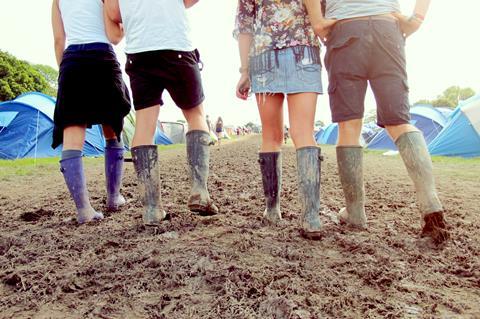Dr Belle Tindall explores how attending a festival reflects our inherent need for awe and wonder – and says we shouldn’t avoid such places even if they are full of misogyny

This time next month I’ll be incredibly tired, possibly a little achy, definitely sporting a combination of glitter and dry shampoo, and probably still weighing up the pros and cons of using a Shewee.
Yup. I’ll be at Glastonbury.
I, along with around 210,000 others, will have descended upon Somerset’s infamous Worthy Farm for, what we hope will be, five magical (albeit damp) days.
When sociologists speak of Glastonbury, and festivals in general for that matter, they tend to speak of them as ‘liminal’ spaces: places that are neither ‘here’ nor ‘there’, they’re an escape, a blip in our summer calendar, a time of disorientation and ambiguity. A dream state, almost. And that’s probably true, as we all seek an occasional escape route from reality, and 210,000 of us have found one – in Somerset of all places. For those few days, life outside Worthy Farm doesn’t exist.
But, as a Christian, I tend to think there’s a little more to it. I’m convinced that there’s something deeper that draws us to these over-crowded fields. And I’m intense, so I’ve naturally tried to work out what that may be.
Evidence of a deep need
Hundreds of thousands of strangers, many of whom will have travelled a considerable distance and paid a hefty price, will commune together in one place at one time. They’ll sacrifice comfort, sleep and even toilet paper to do so. Why? I think it’s because we humans are made with an inherent need for awe and wonder. There is something innate within us that is awoken when we are faced with something great, something bigger than us. We were made for mystical, unexplainable, joyous experiences. And so, I’ve begun to see music festivals as evidence of this craving.
And naturally, I would argue that people’s craving for bigger things is a symptom of their craving for the bigger thing. The biggest, truest and most wonderous thing there is.
They crave God; they go to Glastonbury. At least, that’s my theory.
And so, when I see Christians belittling such places and experiences, I can’t help but groan a little. Trust me, there’s something more important happening in these places than is initially apparent. It goes deeper than glitter and over-priced beer, I promise. I don’t believe that being a Christian means that we have to boycott these spaces; you can bet your bottom-dollar that Jesus doesn’t.
Broken places
That’s not to say that there’s no darkness there. There’s a whole heap of brokenness on display too. For me to deny that there’s an underbelly to these places would be dishonest and dangerous. Particularly because – can you guess who tend to face the brunt of it?
You’ve got it. Women.
In fact, you want to know something really interesting? It’s not my Christian identity that feels incompatible with going to ‘secular’ musical festivals. If anything, it’s more-so my female identity.
I have no idea why, but there’s a special kind of misogyny that is reserved for women who go to music festivals. It’s always been there, unspoken but undeniable. But it’s recently been epitomised by a couple of posts on X, formerly known as Twitter, put into the world by none other than Andrew Tate. Ugh. (I’m not even sure how to sum up who he is, so if you’re not yet acquainted with him, give him a Google. But I warn you, it’ll depress you.) He wrote:
“Avoid women who go to festivals. They’re either on some loser’s table who’s feeding them cocaine or in a crowd of sweaty peasants because they’re a sweaty peasant. Endless Instagram stories screaming and having ‘fun’ to prove to the world they’re worthless. Hard pass festih**s.”
Charming guy, right? And he wasn’t done…
“Imagine being 24 and gorgeous and sweet and nice and finally getting a date with the Top G [I’m assuming he means himself here] and he finds out you went to a festival when you were 19 and you get left on read and NEVER RECOVER.”
His words are rooted in two things: an utter contempt for women and a complete misunderstanding of what is driving people (men and women) to these festivals.
His words would be laughable if they weren’t actually having a dangerous effect. These posts are proof that diminishing the intentions of festival-goers, especially those who happen to be women, can actually be pretty serious. This year, women are expected to feel less safe than ever at these events. And, even though action will be taken to make it as safe as possible for women like me, I find that utterly infuriating.
Glastonbury is a broken and beautiful place; brimming with our truest intuitions and our deepest flaws. And so, I’ll be there. I’m refusing to have my reasons for being there diminished, refusing to allow my female identity to stop me from observing hundreds of thousands of people on their quest for awe and wonder.
Who knows, maybe I’ll even be able to point one or two of them to the only true source of such things.
Dr Belle Tindall is Seen and Unseen’s resident writer (see seenandunseen.com) and co-host of its ‘Re-Enchanting’ podcast. With a doctorate in biblical studies, she has a few specialisms; one of which is feminist theology.

































No comments yet